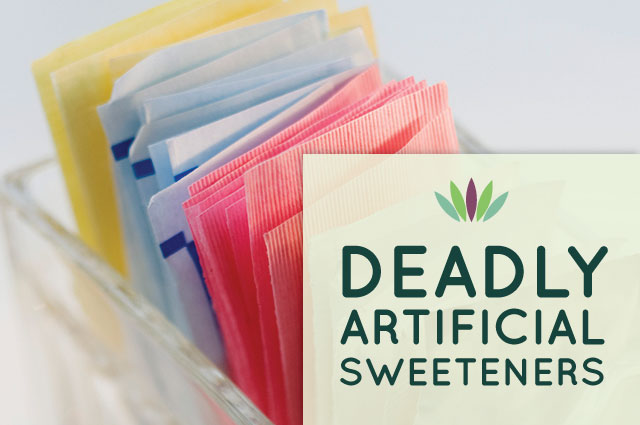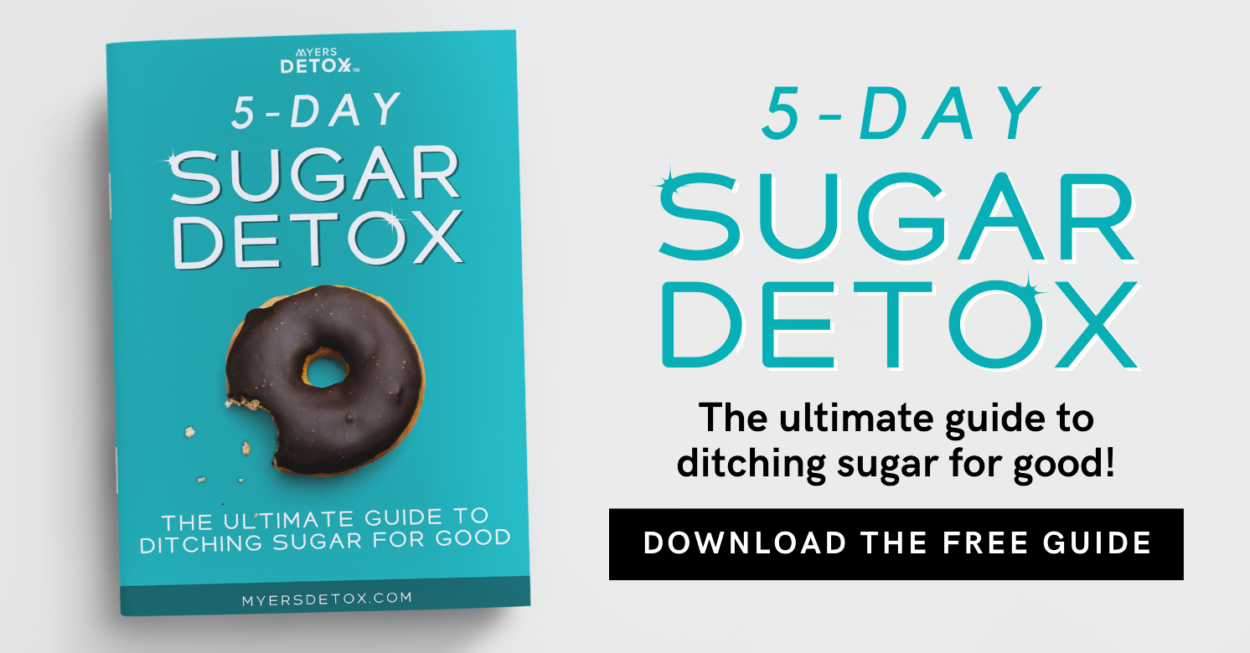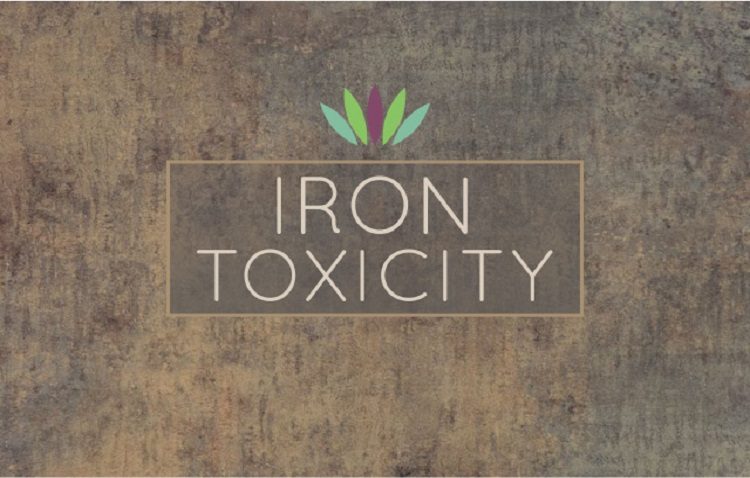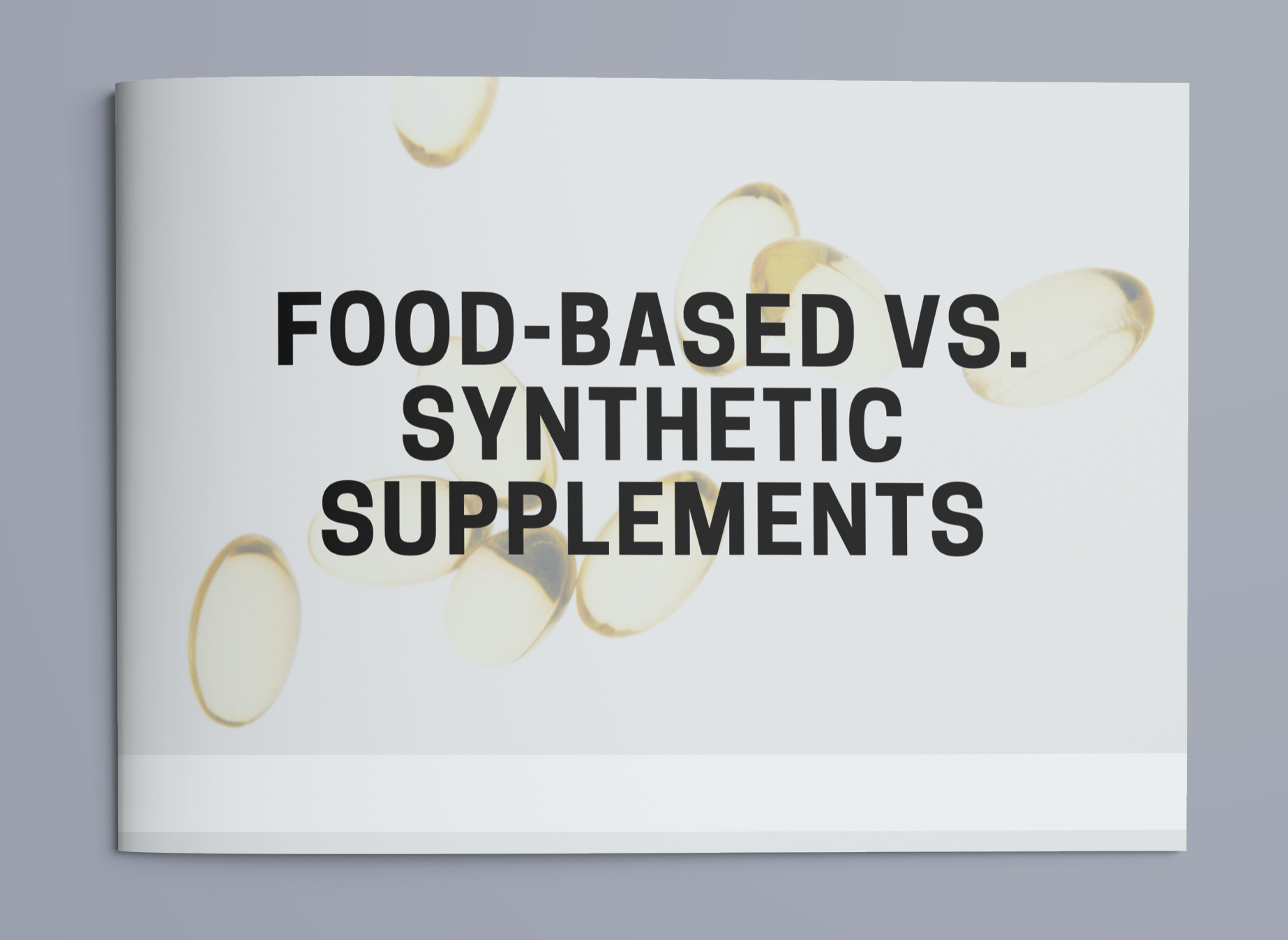Dangerous Artificial Sweeteners

The health consequences of consuming artificial sweeteners are shocking. Many cancers have increased when an artificial sweetener has come onto the market. It is very important to know which sweeteners are safe and which are deadly.
Artificial sweeteners are used in beverages, candies, chewing gum, yogurts, and 6000 other products to provide sweetness without the calories. But are they safe? Controversies have swirled around most of these additives. Well studied additives like acesulfame potassium, aspartame, and saccharin pose a slight risk of cancer. These deadly artificial sweeteners deal a health-blow to your body by introducing chemicals that either shouldn’t be in your body or that your body has a hard time excreting. Let’s review some of the worst artificial sweeteners.
Aspartame: NutraSweet, Equal, Spoonful, Equal-Measure, Canderel
Whenever your body tries to process an unrecognizable unnatural substance like aspartame, the stage is set for health problems. Aspartame causes more adverse symptoms, health conditions, and disease than all food additives combined. I would absolutehttps://www.ncbi.nlm.nih.goly avoid this deadly artificial sweetener.
There have been more reports to the FDA for aspartame reactions than for all other food additives combined with over 10,000 documented reports of adverse reactions, including death. Aspartame accounts for 75 percent of adverse reactions to food additives reported to the FDA. There are over 900 published studies on the health hazards of aspartame. See the list in the National Library Medicine Index. Since it is estimated only about one percent of people who experience a reaction report it, it is safe to assume at least a million people have had a reaction to this chemical.
Over a hundred side effects can accompany the use of aspartame. The June 2009 issue of the Clinical Journal of Pain lists aspartame as a food trigger for migraine headaches, noting that many people are sensitive to it. My husband drinks at least five diet Coke’s a day and he is constantly getting headaches, stomach aches and heart palpitations, but he just can’t believe they are being caused by his death soda. The Center for Science in the Public Interest (CSPI) reports that aspartame can cause neurological problems and that consumption of the artificial sweetener, over extended periods of time, increases cancer risks. A 2010 study found that artificially sweetened drinks probably caused premature deliveries; the researchers suspected that aspartame was the culprit, but the study needs to be confirmed by other scientists.
Commonly reported symptoms of an aspartame reaction include:
| Symptoms | Reactions |
|---|---|
| headache | change in mood |
| change in vision | convulsions and seizures |
| sleep problems/insomnia | change in heart rate |
| hallucination | abdominal cramps/pain |
| memory loss | rash |
| nausea and vomiting | fatigue and weakness |
| dizziness/poor equilibrium | diarrhea |
| hives | joint pain |
The biggest concern with Aspartame is that it has been shown to increase cancers. After aspartame’s approval for use in diet soda in 1983, over a million pounds of aspartame were consumed. In 1984, brain cancer rates increased higher than for any other type of cancer. According to the National Cancer Institute, there was a 10 percent increase in malignant brain cancer in 1985 — just two years after aspartame flooded the market in diet drinks. Equally alarming is evidence that women of childbearing age who consumed aspartame during pregnancy were delivering babies with an increased risk of brain and spinal cord cancer.
Aspartame breaks down into aspartate, phenylalanine and methanol in the body. No amount of methanol is good for your body. Manufacturers maintain that the amount of methanol is so small that you don’t have to worry about it, but others think differently. Multiple sclerosis is caused in part by increased methanol intake. Countries that have high methanol contents in their food have increased rates of MS.
The two primary components of aspartame, phenylalanine and aspartic acid, are amino acids that are combined in a bond in the product. You consume them in the foods you eat, but they are harmless when consumed as part of natural unprocessed foods. However, when they are chemically manipulated and consumed out of the normal ratios to other amino acids, they can cause problems.
Your body initially breaks down the ester link between the two amino acids to turn them into free amino acids, which normally do not occur in these free forms in your body. These chemicals in their free form can result in immediate health consequences such as headaches, mental confusion, dizziness and seizures. The high concentrations of these chemicals in the form of aspartame flood your central nervous system and can cause excessive firing of brain neurons. A phenomenon call excitotoxicity occurs where cells are overly excited, swell, and then die. Long-term use of excitotoxins like aspartame are linked to degenerative brain diseases like Alzheimer’s, Parkinson’s, and general dementia. Enough said. I’m sure you won’t be enjoying this product any time soon.
Saccharin: Sweet’N Low, SugarTwin
While saccharin is banned in other countries, it is still available in the United States and is making a comeback. Saccharin is again showing up in a lot of artificially sweetened foods because it is super sweet and is now blended with other sweeteners to mask the metallic taste.
Saccharin is a sulfa-based sweetener; its primary ingredient is benzoic sulfimide. Reported side effects include allergic reactions for those with sulfa allergies, nausea, diarrhea, skin problems or other allergy-related symptoms.
The Center for Science in the Public Interest states that,
Like other artificial sweeteners, it has been found to cause cancer in the urinary tract and bladder in rodents. Because of this it was pulled from the shelves because of a public outcry. In other rodent studies, saccharin has caused cancer of the uterus, ovaries, skin, blood vessels, and other organs. Companies who manufacture saccharin will tell you that it passes through your body undigested. If this is true, it makes one wonder how it gets from the intestinal tract to the bladder to cause cancer. Saccharin has also been shown to increase the cancer-causing effects of other compounds.
In 1977, the FDA proposed that saccharin be banned, because of studies that it caused cancer in animals. However, Congress intervened and permitted it to be used, provided that foods bear a warning label. It has been replaced in many products by aspartame (NutraSweet). In 1997, the diet-food industry began pressuring the U.S. and Canadian governments and the World Health Organization to take saccharin off their lists of cancer-causing chemicals. The industry acknowledges that saccharin caused bladder cancer in male rats, but argued that those tumors are caused by a mechanism that would not occur in humans. Many public health experts responded by stating that, even if that still-unproved mechanism were correct in male rats, saccharin could cause cancer by additional mechanisms and that, in some studies, saccharin has caused bladder cancer in mice and in female rats and other cancers in both rats and mice.
In May 2000, the U.S. Department of Health and Human Services removed saccharin from its list of cancer-causing chemicals. Later that year, Congress passed a law removing the warning notice that likely will result in increased use in soft drinks and other foods and in a slightly greater incidence of cancer. Sweet ‘n’ Low tastes like crap anyways, so why bother?
Acesulfame Potassium (K): Sunett, Sweet One
Acesulfame K is a potassium salt containing methylene chloride, a known carcinogen. It is an agent which is also used as a propellant, de-greaser and paint stripper. Reported side effects of long-term exposure to methylene chloride can include nausea, headaches, mood problems, hypoglycemia, impairment of the liver and kidneys, problems with eyesight and possibly cancer.
Studies about the effects of acesulfame-K are mixed. A July, 2008 study in Preventive Medicine states that the use of artificial sweeteners over a 10 year period encouraged the development of urinary tract tumors, while a report from the 2005 National Toxicology Program states specifically that acesulfame-K showed no evidence of cancer activity in rats.
One reason to avoid this no calorie sweetener is because it can affect your thyroid, which can decrease your metabolism and contribute to weight gain. Your thyroid sets your metabolism and burns the calories you eat. If it doesn’t work, you gain weight. Large doses of acetoacetamide, a breakdown product of Acesulfame K, have been shown to affect the thyroid in rats, rabbits, and dogs. Hopefully, the small amounts added to foods do not harm your thyroid, but if it affects the thyroid in several different animals, it could possibly affect yours. Not worth it to save calories.
Of all artificial sweeteners, acesulfame-K has undergone the least scientific scrutiny. Early studies showed a potential link between the sweetener and development of multiple cancers in laboratory animals. The Center for Science in the Public Interest states that it can be potentially dangerous, and is an additive that should be avoided.
Sucralose: Splenda
Sucralose is an organochloride. Organochlorides are some of the most toxic substances on the earth (many pesticides are organochlorides and are toxic in small doses). Just because Splenda is an organochloride doesn’t mean it’s toxic, but it should raise some eyebrows. Sucralose is a synthetic additive created by chlorinating sugar. In the five step patented process of making sucralose, three chlorine molecules are added to a sugar molecule. The result: the chemical structure of the chlorine in sucralose is almost the same as that in the now-banned pesticide DDT. DDT in my green tea really gets me going in the morning.
Splenda has been shown to increase migraine headaches and needs more long-term studies to determine its safety. Other reported side effects include muscle aches, stomach cramps and diarrhea, bladder issues, skin irritation, dizziness and inflammation.
Only two clinical trials were completed and published before the FDA approved sucralose for human consumption. The two published trials had a grand total of 36 total human subjects. Hard science at its best. The longest trial at this time was conducted for only four days and looked at sucralose in relation to tooth decay, not human tolerance. Hmmm. I love how the FDA so vigorously protects the health of our citizens over corporate profit (cue: laughter).
Research has shown sucralose can cause shrinking of the thymus gland, an important immune system regulator, and liver and kidney dysfunction. A recent study by Duke University found sucralose reduces healthy intestinal bacteria, which are needed for proper digestion. However, this study was funded by the sugar industry, so I suspect that these findings may not be entirely accurate. The study was poorly designed; it needs to be repeated with an improved design before demonstrating a problem.
The Center for Science in the Public Interest reports on the latest studies:
In 2012, an independent Italian laboratory announced (but has not yet published) a study that was said to find that sucralose caused leukemia in mice. That was the same lab that several years earlier published studies indicating that aspartame caused leukemia in rats. Because of possible flaws in the aspartame studies, the findings on both artificial sweeteners need to be confirmed by other independent scientists before one could conclude that either poses a real risk to consumers.
Given the limited number of human trials available on Sucralose, we can turn to anecdotal evidence on this product’s safety. Dr. Mercola has a forum on this site where many have posted their reactions to Sucralose. Sadly, I ate a ton of this stuff when I was pregnant thinking it was a better alternative to NutraSweet. I put ten packets a day in the black or green tea I had with every meal. Now my daughter is behind one year in her speech. Could it be the cause or a contributor? I don’t know, but I’m sure it didn’t help.
Studies Show Artificial Sweeteners Lead to Weight Gain
Mark Hyman, a noted doctor of functional medicine, quoted an important study detailing how artificial sweeteners lead to weight gain:
An exciting study in the Journal of Behavioral Neuroscience has shown conclusively that using artificial sweeteners not only does not prevent weight gain, but induces a whole set of physiological and hormonal responses that actually make you gain weight. The researchers proved this by giving two different groups of rats some yogurt. One batch of yogurt was sweetened with sugar. The other was sweetened with saccharin. They found that three major things happened over a very short period of time in the rats that were fed artificially sweetened yogurt.
First, the researchers found that the total food eaten over 14 days dramatically increased in the artificial sweetener group — meaning that the artificial sweetener stimulated their appetite and made them eat more.
Second, these rats gained a lot more weight and their body fat increased significantly.
And third (and this is very concerning) was the change in core body temperature of the rats fed the artificial sweeteners. Their core body temperature decreased, meaning their metabolism slowed down.
So not only did the rats eat more, gain more weight, and have more body fat, but they actually lowered their core body temperature and slowed their metabolism. As I have said many times before, all calories are not created equal. The most astounding finding in the study was that even though the rats that ate the saccharin-sweetened yogurt consumed fewer calories overall than the rats that ate the sugar-sweetened yogurt, they gained more weight and body fat.
Are Artificial Sweeteners Making you Sick?
If you suffer a reaction to artificial sweeteners, it can be almost impossible to make the connection to aspartame or other sweetener. Many spend years trying to find out why they are sick. Doing an elimination diet by excluding all artificial sweeteners may clarify if they are, in fact, causing your symptoms. Simply reintroduce them one by one after a couple months and wait to see if your symptoms return.
If you don’t notice any significant difference in how you feel, it’s likely you’re able to tolerate aspartame, meaning your body doesn’t have an immediate, adverse response. However, this doesn’t mean your health won’t be damaged in the long run by this chemical and its breakdown products. Neurological damage can occur from long-term aspartame use.
Formate, which is the waste product of formaldehyde, which is a metabolite of aspartame, is suspected of inducing poly chemical hypersensitivity (PCS) in some individuals. If your body develops acute sensitivity to multiple chemicals, you may be unable to tolerate relatively low exposure to aspartame, other artificial sweeteners, preservatives, perfumes and other substances, many of which are unavoidable as you go about your daily life.
Whether or not you notice an immediate difference in your health after you stop ingesting these toxins, my advice is to remain artificial sweetener-free except for the sweeteners listed in my article Safe Artificial Sweeteners.
My Advice
Even the deadly artificial sweeteners are less carcinogenic than sucrose (table sugar). But why use artificial sweeteners whose safety is clearly not demonstrated? If you must use artificial sweeteners, at least use safe alternatives like Stevia, Xylitol and Lakanto.
Many trying to get off sugar think they can still have their cake and eat it, too. Generally, you reach for artificial sweeteners for several reasons: weight loss, controlling blood sugar or trying to kick a sugar addiction. Sadly, most artificial sweeteners do not accomplish these health goals: they don’t help you lose weight or control blood sugar and they can make your sweet cravings worse.
If you turn to artificial sweeteners to help you with cravings, they are not going to help with this problem. Artificial sweeteners actually increase cravings by continuing your addiction to super-sweet tasting foods. It will only take three weeks of complete abstinence of sweet tasting substances to abolish your sweet cravings (psychological cravings will remain, however). You simply have to avoid all sweet tasting foods and artificial sweeteners during this time and your cravings will subside.
Are you using artificial sweeteners for weight loss? While they have little or no calories, they are not helping you to lose weight. Most of these sweet chemicals cause your insulin to rise. When insulin rises, your blood sugar is lowered. Low blood sugar causes you to crave and eat more. Studies have shown that people who consume artificial sweeteners eat more calories than people who don’t for this reason. Additionally, this rise in insulin signals your body to store fat or not use it as fuel. So, the weight stays on your body….
Click Here for References+
1. Blaylock, Russell, MD. Excitotoxins: The Taste That Kills. Health Press (NM), 2006
2. Center for Science in the Public Interest. Food Additives.
http://www.cspinet.org/reports/chemcuisine.htm
3. Giacaman RA, Campos P, Muñoz-Sandoval C, Castro RJ. Carcinogenic potential of commercial sweeteners in an experimental biofilm caries model on enamel. Arch Oral Biol. April 27, 2013.
http://www.ncbi.nlm.nih.gov/pubmed/23631998
4. Gurney, J.G., Pogoda, J.M., and Holly, E.A.
Aspartame Consumption in Relation to Childhood Brain Tumor Risk: Results from a Case-Control Study.
Natl Cancer Inst 89 (1997): 1072-1074
5. Hyman, Mark, MD. Artificial Sweeteners Could Be Sabotaging Your Diet. June 19th, 2010.
http://drhyman.com/blog/2010/06/19/artificial-sweeteners-could-be-sabotaging-your-diet/
6. Mercola, Joseph, OD. Artificial Sweeteners — More Dangerous than You Ever Imagined. October 13, 2009.
http://articles.mercola.com/sites/articles/archive/2009/10/13/artificial-sweeteners-more-dangerous-than-you-ever-imagined.aspx
7. ** The Potential Dangers of Sucralose (Splenda). December 3, 2000.
http://articles.mercola.com/sites/articles/archive/2000/12/03/sucralose-dangers.aspx
8. ** The Potential Dangers of Sucralose. December 3, 2000.
http://articles.mercola.com/sites/articles/archive/2000/12/03/sucralose-testimonials.aspx
9. **Sweet Deception. Thomas Nelson, 2006.
10. Olney, J.W., Farber, N.B., Spitznagel, E., and Robbins, L.N. “Increasing Brain Tumor Rates: Is There a Link to Aspartame?” J. Neuropathol Exp Neurol 55 (1996): 1115:123
11. Skae, Teya. The Harmful Effects of Sugar and Choosing Healthy Alternatives. February 21, 2008.
http://www.naturalnews.com/022692_sugar_xylitol_stevia.html#ixzz2Qw23cS57
12. Soffritti M, Belpoggi F, Tibaldi E, et al: Life-span exposure to low doses of aspartame beginning during prenatal life increases cancer effects in rats. Environ Health Perspect. 2007 Sep; 115(9):1293-7.
13. Sweet Misery. Documentary.
http://topdocumentaryfilms.com/sweet-misery-a-poisoned-world/
14. Roberts, HJ. Aspartame (NutraSweet): Is it Safe? The Charles Press, 1990.
15. Patel RM, Sarma R, Grimsley E: Popular sweetener sucralose as a migraine trigger. Headache. 2006 Sep; 46(8):1303-4. Swithers SE, Davidson TL. A role for sweet taste: Calorie predictive relations in energy regulation by rats. Behavioral Neuroscience. 2008 Feb; 122(1):161-73.
16. Wikipedia.com. Neotame.
http://en.wikipedia.org/wiki/Neotame










